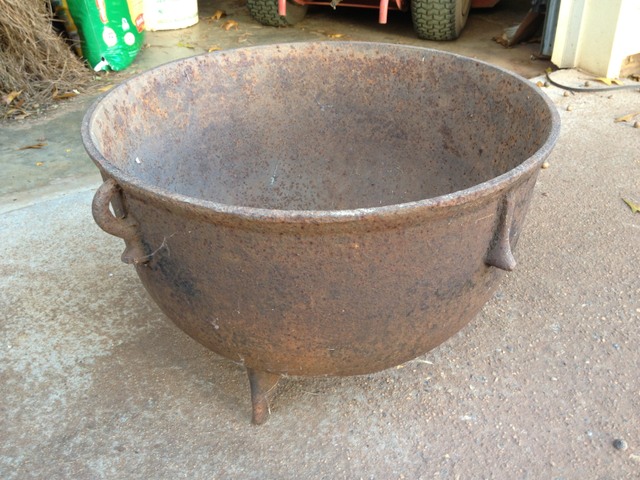Sand, or bead blasting is the most effective method for removing corrosion from metal. Bead blasting, with dust size glass beads is the method I used to remove corrosion from metal when I worked for Lockheed. It was super effective.
If that isn't available to you, a wire wheel, attached to a drill will work. If you don't have that, coarse emery cloth, again attached to a drill will work. I think I would wet sand, using cooking oil to wet the emery cloth. If you don't have a drill, you can even use a rotary tool, such as a Dremel tool, or something like it. If you have no electric tools, you can block sand it, with a rounded, or flexible block, again with emery cloth, or use a wire brush to remove the rust.
The above methods for removing the rust are listed from easiest method, to the most work intensive method.
To season, you are going to have to find a way to bring the metal up to at least 350' for an hour or better. Of course, the hotter the heat source, the faster the metal will heat to the point that the fat will turn into that wonderful seasoning that protects the metal from corrosion, and insulates the food from the bare metal. Also, the seasoning, which I suspect you already know, will make cleaning the pot easier.
A pot that size probably won't fit in your oven. An outside fire will work. All metal must be coated with fat, whether you use cooking oil, lard, or shortening. Don't use butter. It has solids in it that will burn and leave a bad tasting residue in the pan, before the fat has a chance to turn into an effective coating.
If you have any friends with a wood fired pizza oven, or something similar, that will get you pot hot enough. You may have to get creative.
Barring the availability of a kiln, wood fired large brick oven, or somethign similar, hang the pot over and very close to a blistering hot bed of coals. After an hour or so, turn the pot to expose another side to the heat.
I would season that pot outside, as the seasoning process will probably generate a significant amount of soap.
I think that about covers your options. Oh wait, one more really good option, take that pot to a machine shop and ask them to remove the rust. They will charge you, but they will also be doing the labor. If they have a way to season it with food grade oil, all the better. If not, maybe you have a friend with a turkey fryer. You can use that burner to season it, again by hanging the pot over the flame. A sturdy tripod with a chain should handle the hanging chore.
Seeeeeeya; Chief Longwind of the North



